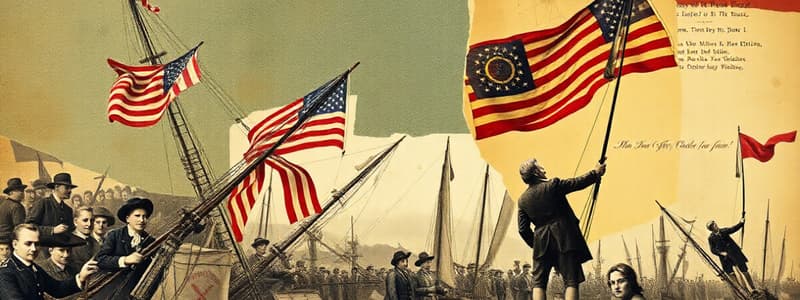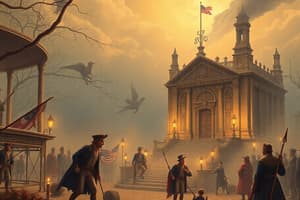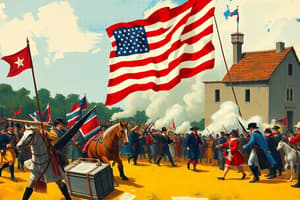Podcast
Questions and Answers
What was the main purpose of the Preamble in the Declaration of Independence?
What was the main purpose of the Preamble in the Declaration of Independence?
- To outline the upcoming battles of the war
- To list the rights of the colonists
- To declare war on Great Britain
- To express reasons for wanting independence (correct)
A loyalist is a colonist who supported independence from Great Britain.
A loyalist is a colonist who supported independence from Great Britain.
False (B)
Who gave the speech that included the phrase 'give me liberty, or give me death!'?
Who gave the speech that included the phrase 'give me liberty, or give me death!'?
Patrick Henry
The first 'battle' of the Revolutionary War took place at __________.
The first 'battle' of the Revolutionary War took place at __________.
Which groups were formed to help colonists cooperate and lead on colonial matters?
Which groups were formed to help colonists cooperate and lead on colonial matters?
Match the following events with their outcomes:
Match the following events with their outcomes:
The Sons of Liberty were formed in 1776 to protest British taxation.
The Sons of Liberty were formed in 1776 to protest British taxation.
Which document outlines the basic human rights that every colonist should have?
Which document outlines the basic human rights that every colonist should have?
Flashcards
Patriot
Patriot
A colonist who supported the American Revolution and believed in self-governance.
Loyalist
Loyalist
A colonist who remained loyal to Great Britain during the American Revolution.
Sons of Liberty
Sons of Liberty
A group of colonists who protested against British policies like the Stamp Act, formed in 1765.
Committees of Correspondence
Committees of Correspondence
Signup and view all the flashcards
"Give Me Liberty or Give Me Death!"
"Give Me Liberty or Give Me Death!"
Signup and view all the flashcards
Ally
Ally
Signup and view all the flashcards
Battles of Lexington and Concord
Battles of Lexington and Concord
Signup and view all the flashcards
Battle of Saratoga
Battle of Saratoga
Signup and view all the flashcards
Study Notes
Patriot vs. Loyalist
- A patriot is a colonist who believed they had the right to govern themselves.
- A loyalist is a colonist with strong loyalty to Great Britain.
Sons and Daughters of Liberty
- The Sons of Liberty were protestors against Great Britain, formed in 1765.
- The Daughters of Liberty were a female association protesting British Acts, also formed in 1765.
Committees of Correspondence
- Groups appointed by colonial legislatures to foster cooperation.
- Their role was to aid intercolonial communication and leadership.
Patrick Henry's Speech
- Patrick Henry famously urged colonists to fight for independence with his "Give me liberty, or give me death!" speech.
The Preamble and Grievances
- The Preamble provided the justification for seeking independence.
- It explained the reasons for the colonists' desire for freedom.
- The List of Grievances detailed the colonists' complaints against British rule.
- The colonists felt they already possessed basic human rights.
The Battles of Lexington and Concord
- The first battle of the American Revolution occurred at Lexington and Concord.
- The British aimed to seize colonial weapons, but the colonists fought back and the British suffered losses.
- The battle turned out favorable to the colonists and signaled the beginning of the Revolution.
The Crisis
- Thomas Paine's writings, particularly The Crisis, inspired the colonists during the Revolutionary War.
- His work motivated them to keep fighting.
Saratoga and Alliance with France
- The British defeat at Saratoga was a turning point in the war.
- France joined the American cause, providing crucial support in the fight against Great Britain.
- Spain joined the conflict in support of the colonists.
The Treaty of Paris 1783
- The Treaty of Paris of 1783 officially ended the American Revolution.
- The treaty acknowledged American independence and established the boundaries of the new nation.
- The treaty restored properties to loyalists as agreed by the US.
After Effects of the Revolution
- The American Revolution inspired other movements for independence across the globe.
- The Revolution led to the formation of new governments, often based on democratic principles.
- The effects of the Revolution continued to be debated and discussed long after the conflict concluded.
Studying That Suits You
Use AI to generate personalized quizzes and flashcards to suit your learning preferences.




